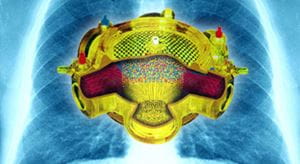
Liver transplantation (which UPMC surgeons helped to make feasible) is the standard of care for many liver diseases. But donor organs are scarce, and some people succumb to liver failure before a donor is found. McGowan Institute research will provide assistance while new therapies incorporating stem cells, gene therapy, or engineered tissues are employed to repair or replace the damaged organ.
In the process of clinical translation of tissue developments into cell-based therapies in transplantation medicine and intensive care, researchers in the laboratory of McGowan Institute faculty member Jörg Gerlach, MD, PhD, are working towards liver cell transplantation for patients with end-stage liver disease. Although hepatic cell transplantation holds the promise of bridging patients with end-stage chronic liver failure to whole liver transplantation, suitable cell populations are under debate. In addition to hepatic cells, mesenchymal stem cells and hematopoietic stem cells are being considered as alternative cell sources for initial clinical cell work.
It might be possible to heal cirrhotic liver disease by rebooting the genes that control liver cell function, according to McGowan Institute for Regenerative Medicine affiliated faculty members—Ira Fox, MD, Aaron W. Bell, PhD, Yoram Vodovotz, PhD, and Alejandro Soto-Gutierrez, MD, PhD—and researchers at UPMC Children’s Hospital of Pittsburgh and the University of Pittsburgh School of Medicine. If validated in human studies, the game-changing strategy could potentially treat patients who are too sick for liver transplantation and, in the future, reduce the need for transplants.
Learn more about reversing liver failure by rebooting cell programming .
McGowan Institute affiliated faculty member George Mazariegos, MD, specializes in the treatment of pediatric patients who have liver and/or intestinal disease that require transplantation. He also cares for children who develop acute liver failure and who may require specialized liver support therapies until they recover or until donor organs are available. His research focuses on further refining immunosuppression therapy to improve transplant outcomes and quality of life. He currently is leading clinical efforts to evaluate lowering or withdrawing immunosuppression in long-term liver transplant recipients to maximize quality of life and minimize post-transplant complications. Dr. Mazariegos also is analyzing immunologic characteristics of patients successfully withdrawn from immunosuppression. This study, sponsored by the Immune Tolerance Network, is attempting to develop a "tolerance assay" that can be used to prospectively characterize patients who may be candidates for less immunosuppression.
Organogenesis is the process by which internal organs are formed. This complex biological process takes place during the embryonic phase but, in some cases, is reactivated during regenerative processes like after a hepatectomy when the liver regenerates. In the laboratory of McGowan Institute faculty member Eric Lagasse, PharmD, PhD, work is focused on a new paradigm for tissue remodeling and eventually organogenesis, by using lymph nodes as in vivo bioreactors to grow tissue or organ substitutes. Currently, the laboratory is involved in several tissue remodeling experiments and more specifically in developing an ectopic liver in a lymph node.
Learn more about the Eric Lagasse Lab.

















